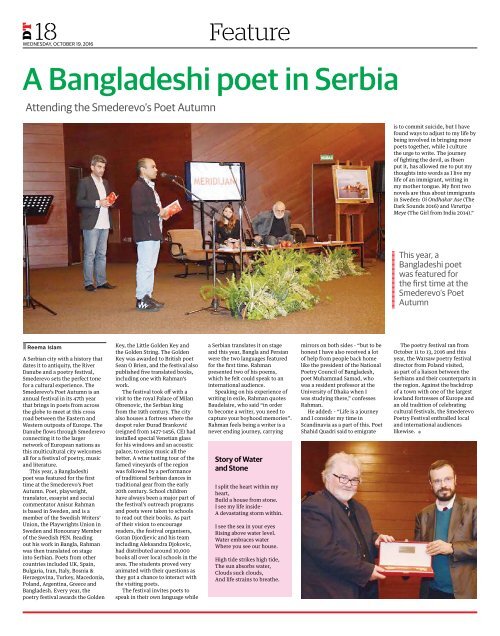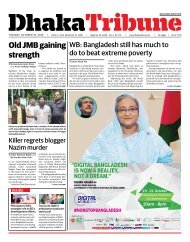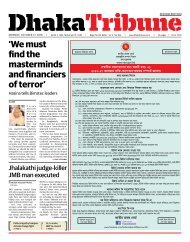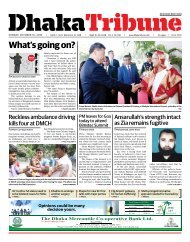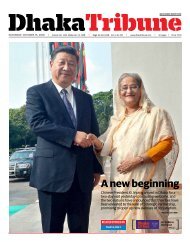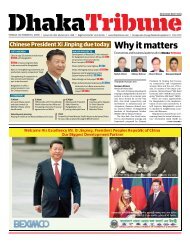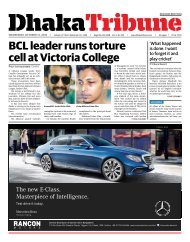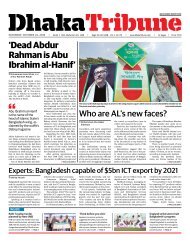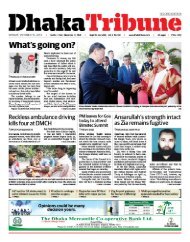ePaper_2nd Edition_October 19, 2016
Create successful ePaper yourself
Turn your PDF publications into a flip-book with our unique Google optimized e-Paper software.
18<br />
WEDNESDAY, OCTOBER <strong>19</strong>, <strong>2016</strong><br />
DT<br />
Feature<br />
A Bangladeshi poet in Serbia<br />
Attending the Smederevo’s Poet Autumn<br />
is to commit suicide, but I have<br />
found ways to adjust to my life by<br />
being involved in bringing more<br />
poets together, while I culture<br />
the urge to write. The journey<br />
of fighting the devil, as Ibsen<br />
put it, has allowed me to put my<br />
thoughts into words as I live my<br />
life of an immigrant, writing in<br />
my mother tongue. My first two<br />
novels are thus about immigrants<br />
in Sweden: Oi Ondhakar Ase (The<br />
Dark Sounds <strong>2016</strong>) and Varatiya<br />
Meye (The Girl from India 2014).”<br />
This year, a<br />
Bangladeshi poet<br />
was featured for<br />
the first time at the<br />
Smederevo’s Poet<br />
Autumn<br />
• Reema Islam<br />
A Serbian city with a history that<br />
dates it to antiquity, the River<br />
Danube and a poetry festival,<br />
Smederevo sets the perfect tone<br />
for a cultural experience. The<br />
Smederevo’s Poet Autumn is an<br />
annual festival in its 47th year<br />
that brings in poets from across<br />
the globe to meet at this cross<br />
road between the Eastern and<br />
Western outposts of Europe. The<br />
Danube flows through Smederevo<br />
connecting it to the larger<br />
network of European nations as<br />
this multicultural city welcomes<br />
all for a festival of poetry, music<br />
and literature.<br />
This year, a Bangladeshi<br />
poet was featured for the first<br />
time at the Smederevo’s Poet<br />
Autumn. Poet, playwright,<br />
translator, essayist and social<br />
commentator Anisur Rahman<br />
is based in Sweden, and is a<br />
member of the Swedish Writers’<br />
Union, the Playwrights Union in<br />
Sweden and Honourary Member<br />
of the Swedish PEN. Reading<br />
out his work in Bangla, Rahman<br />
was then translated on stage<br />
into Serbian. Poets from other<br />
countries included UK, Spain,<br />
Bulgaria, Iran, Italy, Bosnia &<br />
Herzegovina, Turkey, Macedonia,<br />
Poland, Argentina, Greece and<br />
Bangladesh. Every year, the<br />
poetry festival awards the Golden<br />
Key, the Little Golden Key and<br />
the Golden String. The Golden<br />
Key was awarded to British poet<br />
Sean O Brien, and the festival also<br />
published five translated books,<br />
including one with Rahman’s<br />
work.<br />
The festival took off with a<br />
visit to the royal Palace of Milan<br />
Obrenovic, the Serbian king<br />
from the <strong>19</strong>th century. The city<br />
also houses a fortress where the<br />
despot ruler Đurađ Branković<br />
(reigned from 1427-1456, CE) had<br />
installed special Venetian glass<br />
for his windows and an acoustic<br />
palace, to enjoy music all the<br />
better. A wine tasting tour of the<br />
famed vineyards of the region<br />
was followed by a performance<br />
of traditional Serbian dances in<br />
traditional gear from the early<br />
20th century. School children<br />
have always been a major part of<br />
the festival’s outreach programs<br />
and poets were taken to schools<br />
to read out their books. As part<br />
of their vision to encourage<br />
readers, the festival organisers,<br />
Goran Djordjevic and his team<br />
including Aleksandra Djokovic,<br />
had distributed around 10,000<br />
books all over local schools in the<br />
area. The students proved very<br />
animated with their questions as<br />
they got a chance to interact with<br />
the visiting poets.<br />
The festival invites poets to<br />
speak in their own language while<br />
a Serbian translates it on stage<br />
and this year, Bangla and Persian<br />
were the two languages featured<br />
for the first time. Rahman<br />
presented two of his poems,<br />
which he felt could speak to an<br />
international audience.<br />
Speaking on his experience of<br />
writing in exile, Rahman quotes<br />
Baudelaire, who said “in order<br />
to become a writer, you need to<br />
capture your boyhood memories”.<br />
Rahman feels being a writer is a<br />
never ending journey, carrying<br />
Story of Water<br />
and Stone<br />
I split the heart within my<br />
heart,<br />
Build a house from stone.<br />
I see my life inside–<br />
A devastating storm within.<br />
I see the sea in your eyes<br />
Rising above water level.<br />
Water embraces water<br />
Where you see our house.<br />
High tide strikes high tide,<br />
The sun absorbs water,<br />
Clouds suck clouds,<br />
And life strains to breathe.<br />
mirrors on both sides - “but to be<br />
honest I have also received a lot<br />
of help from people back home<br />
like the president of the National<br />
Poetry Council of Bangladesh,<br />
poet Muhammad Samad, who<br />
was a resident professor at the<br />
University of Dhaka when I<br />
was studying there,” confesses<br />
Rahman.<br />
He added: - “Life is a journey<br />
and I consider my time in<br />
Scandinavia as a part of this. Poet<br />
Shahid Quadri said to emigrate<br />
The poetry festival ran from<br />
<strong>October</strong> 11 to 13, <strong>2016</strong> and this<br />
year, the Warsaw poetry festival<br />
director from Poland visited,<br />
as part of a liaison between the<br />
Serbians and their counterparts in<br />
the region. Against the backdrop<br />
of a town with one of the largest<br />
lowland fortresses of Europe and<br />
an old tradition of celebrating<br />
cultural festivals, the Smederevo<br />
Poetry Festival enthralled local<br />
and international audiences<br />
likewise. •


